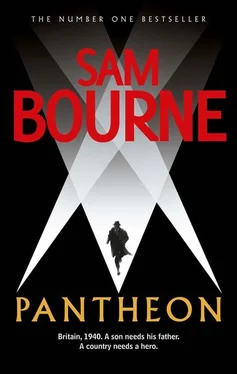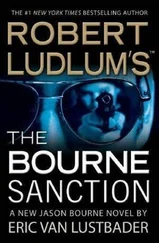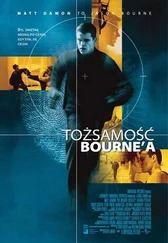Sam Bourne - Pantheon
Здесь есть возможность читать онлайн «Sam Bourne - Pantheon» — ознакомительный отрывок электронной книги совершенно бесплатно, а после прочтения отрывка купить полную версию. В некоторых случаях можно слушать аудио, скачать через торрент в формате fb2 и присутствует краткое содержание. Жанр: Триллер, на английском языке. Описание произведения, (предисловие) а так же отзывы посетителей доступны на портале библиотеки ЛибКат.
- Название:Pantheon
- Автор:
- Жанр:
- Год:неизвестен
- ISBN:нет данных
- Рейтинг книги:3 / 5. Голосов: 1
-
Избранное:Добавить в избранное
- Отзывы:
-
Ваша оценка:
- 60
- 1
- 2
- 3
- 4
- 5
Pantheon: краткое содержание, описание и аннотация
Предлагаем к чтению аннотацию, описание, краткое содержание или предисловие (зависит от того, что написал сам автор книги «Pantheon»). Если вы не нашли необходимую информацию о книге — напишите в комментариях, мы постараемся отыскать её.
Pantheon — читать онлайн ознакомительный отрывок
Ниже представлен текст книги, разбитый по страницам. Система сохранения места последней прочитанной страницы, позволяет с удобством читать онлайн бесплатно книгу «Pantheon», без необходимости каждый раз заново искать на чём Вы остановились. Поставьте закладку, и сможете в любой момент перейти на страницу, на которой закончили чтение.
Интервал:
Закладка:
He glanced across the street, spotting with relief the number 459 — attached not to the grand structure with pillared portico next door, but to a relatively modest colonial-style house, clad in pale clapboard. He had half-expected Grey to put him up in a college dormitory, like some of the younger fellows back home. The last thing James needed now was small-talk with scholars, eagerly making awkward inquiries about his precise ‘field of research’ at Yale. For the short time he hoped to be here, a room in an anonymous boarding house with regular meals would suit him fine.
But the comfort of that delusion was not allowed to persist for long. A knock on the door, answered by a butler — who, to James’s startled surprise, was a negro in late middle age — soon revealed that this was no boarding house but the Elizabethan Club. With its chairs in well-worn leather, the same shade as the elbow-patches Florence’s father had taken to wearing on his tweed jackets in a nod towards wartime thrift, and well-stocked fireplace, even now on a warm, humid day in high summer, it too might have been winched into the skies from Oxford, flown across the Atlantic then dropped, unaltered, on this street in New Haven, Connecticut.
The butler took his name and said that they had been anticipating his arrival. He apologized that Dr Zennor would have to make do with the steward’s quarters, since there was no other accommodation in ‘the Clubhouse’. It took James a moment to realize that the butler was referring not to some sporting pavilion, but this very building. As he huffed his way up the stairs, the servant delivered a potted lecture on ‘the Lizzie’, founded nearly thirty years earlier by a wealthy undergraduate who yearned for a little oasis of calm where literary-inclined students might speak about the arts and suchlike. He stopped on the middle landing to point out the vault where the club kept its priceless collection of Shakespeare Folios, including one of the three surviving copies of the 1604 Hamlet. James imagined the select membership of the Lizzie as the American counterparts of the effete, privileged young men at Christ Church or Magdalen whom he had gone to such lengths to avoid when he was a new undergraduate, nervous, naive and just off the train from Bournemouth. It had not been all that long ago, at the tail end of the 1920s; but it seemed like a different epoch.
The room, however, was monastic in its simplicity. There was a bed, a chair, a desk and a basin and not much else. The asceticism of it appealed to him, but he did fleetingly wonder about Grey’s motives. Was he punishing James with this garret room, or had he deliberately wanted him away from the heart of Yale life, where he might meet fewest people — so keeping his secrets to himself?
James sat on the bed and wondered where he should begin. It was a Sunday, which made it impossible simply to present himself at an administrative office and ask where he might find the Oxford families. If this were Oxford, he would select a college at random, pop in and ask a porter, who were, after all, the best-informed people in the university.
He splashed some water on his face then headed down the stairs, two at a time. He was striding down College Street, deciding that he would stop at the first college he saw — the butler had told him there were ten to choose from — when he heard it: a drifting melody from across the road, the universally familiar sound of a church choir.
Among those Oxford mothers, there was bound to be at least one woman pious enough to attend, maybe even to give thanks for their safe passage across the Atlantic. Not Florence of course; she wouldn’t be seen dead in church. But someone who, on hearing James identify himself, might smile warmly and say, ‘Oh yes, I saw young Harry just this morning. They’re staying two minutes from here; I’ll take you there myself if you would like.’
He ran up the few steps leading to the doorway and went inside. To his surprise, the church was packed, every space on the wooden benches taken. No church in Oxford would get a turnout like this on a warm Sunday in July. Perhaps this was what the experts meant when they said America was a country founded by ‘the Protestants of the Protestants’ — religious zealots whose zeal, it seemed, lived on.
He stood at the back, loitering by the door, suddenly self-conscious. Should he affect to be a churchgoer, late to arrive but here in earnest? Or pose as a tourist, come to admire the gold-inlaid walls and pillars and to gaze at the half-dome above the altar, an artful compromise between grandeur and modesty?
James did a quick scan of the faces before him and recognized none of them. Not that he could conclude from that that there was no one here from Oxford: there might well be several, he just didn’t know them. Inwardly, he cursed the habits he had fallen into since his return from Spain. He had been fairly sociable as a student, avoiding the aristocratic crowd, but jolly enough with everyone else. He was popular in the rowing club; Daisy’s friends had always liked him. But after his return, he had turned inward; could not be bothered remembering names, barely even noticed faces. And now, when he needed the help of someone familiar, he was paying the price.
The music had ended and a cleric had taken his place at the pulpit. White-haired and in his early sixties by James’s reckoning, he looked more earnest than forbidding. The man cleared his throat, then said in an unexpectedly strong voice, ‘My fellow members of Yale. I’m glad to see so many of you here — proof, I guess, that you’ve all had a week so full of sin that you’ve rushed here to repent.’ A ripple of gentle laughter. ‘Well, you’re all welcome. This is God’s house, which means it’s your house. Welcome, welcome.’
The man’s style of speech was a surprise too. He was much more informal than any vicar James had heard speak in England. Even the way he stood seemed to be looser, as if he were wearing more comfortable shoes.
‘Now you heard the lesson we read earlier. From Isaiah,’ — Eye-zay-ah — ‘chapter two, verse four.’ There was a rustling of tissue-thin pages, as many in the congregation consulted their bibles.
The vicar’s voice boomed out loud, the word of God delivered with an American accent: ‘“And he shall judge among the nations, and shall rebuke many people: and they shall beat their swords into ploughshares, and their spears into pruning-hooks: nation shall not lift up sword against nation, neither shall they learn war any more.”’ He paused letting the words linger a while. Then he spoke again.
‘I do not believe we can argue with those words. I believe their meaning is as clear as a freshwater stream: “in the last days”, when we are on the brink of redemption, we will put aside the tools of war. They play no part in the Second Coming of Jesus Christ our Lord. If we are to be worthy of His return, if we are to live life as it is meant to be lived, then we should start now, making ploughshares from swords and pruning hooks from spears. We would grow food, instead of death. We would water the ground with God’s sweet rain, not with the blood of our fellow man.’
There was an emphatic ‘amen’ from some in the room and an unmistakable silence from the rest. James was slowly becoming aware that this was no ordinary Sunday service.
The preacher looked down at the lectern, a tiny gesture that suggested he was coming to a close. ‘I have been chaplain here for most of the last decade. You all know me well and you know my views. They are best summarized not with words, but by our Lord’s eloquent action. A small action, as it happens, but one that is still so radical, still so revolutionary. Struck on one side of his face, Jesus did not hit back. No, he did not. Instead he offered his other cheek. That’s right, he turned the other cheek. And that — that action that is so small but so large — is how we will abolish war. Even when we are provoked — and yes, our consciences are provoked by the violence in Europe — we will resist the urge to shed more blood. We will not fight war with war. As Isaiah says, “neither shall we learn war any more”.’
Читать дальшеИнтервал:
Закладка:
Похожие книги на «Pantheon»
Представляем Вашему вниманию похожие книги на «Pantheon» списком для выбора. Мы отобрали схожую по названию и смыслу литературу в надежде предоставить читателям больше вариантов отыскать новые, интересные, ещё непрочитанные произведения.
Обсуждение, отзывы о книге «Pantheon» и просто собственные мнения читателей. Оставьте ваши комментарии, напишите, что Вы думаете о произведении, его смысле или главных героях. Укажите что конкретно понравилось, а что нет, и почему Вы так считаете.












